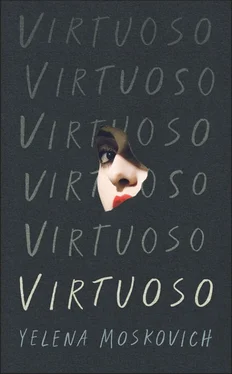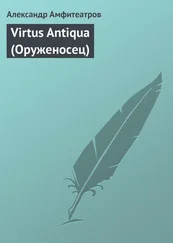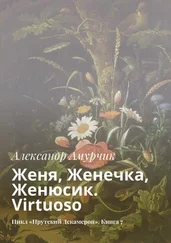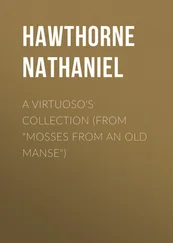Yelena Moskovich - Virtuoso
Здесь есть возможность читать онлайн «Yelena Moskovich - Virtuoso» весь текст электронной книги совершенно бесплатно (целиком полную версию без сокращений). В некоторых случаях можно слушать аудио, скачать через торрент в формате fb2 и присутствует краткое содержание. Город: London, Год выпуска: 2019, ISBN: 2019, Издательство: Serpent's Tail, Жанр: Современная проза, на английском языке. Описание произведения, (предисловие) а так же отзывы посетителей доступны на портале библиотеки ЛибКат.
- Название:Virtuoso
- Автор:
- Издательство:Serpent's Tail
- Жанр:
- Год:2019
- Город:London
- ISBN:978-1-7881-6025-4
- Рейтинг книги:3 / 5. Голосов: 1
-
Избранное:Добавить в избранное
- Отзывы:
-
Ваша оценка:
- 60
- 1
- 2
- 3
- 4
- 5
Virtuoso: краткое содержание, описание и аннотация
Предлагаем к чтению аннотацию, описание, краткое содержание или предисловие (зависит от того, что написал сам автор книги «Virtuoso»). Если вы не нашли необходимую информацию о книге — напишите в комментариях, мы постараемся отыскать её.
Virtuoso — читать онлайн бесплатно полную книгу (весь текст) целиком
Ниже представлен текст книги, разбитый по страницам. Система сохранения места последней прочитанной страницы, позволяет с удобством читать онлайн бесплатно книгу «Virtuoso», без необходимости каждый раз заново искать на чём Вы остановились. Поставьте закладку, и сможете в любой момент перейти на страницу, на которой закончили чтение.
Интервал:
Закладка:
“How was your weekend?” she asked Youssouf.
“Oh, it was fine. Took the kids to the zoo on Saturday. Weather was nice and warm, wasn’t it?”
“Yes. It was.”
“How was your weekend, Madame?”
Saturday had started off promisingly for Aimée, but just as she began motivating herself to go out, it was noon and the day had already begun to sag. She changed back into her house trousers and a worn T-shirt and watched the day pass from the window, telling herself she’d go out tomorrow. When Sunday came, however, she closed the curtains and convinced herself it would rain.
All day, the sun shone broadly in the cloudless sky.
Aimée pushed her swivel chair closer to her desk and continued going through the phone messages from the weekend.
The doctor came in late. His first patient, Mme Mercier, was the type of woman who expressed her annoyance flirtatiously, which Dr Christian Coste cultivated, so no one was too dismayed by the forty-five-minute setback. Aimée organised the incoming lab results and updated two patient files, and made another appointment for poor Mme Blanchard who had another yeast infection.
At lunch, she logged out of her computer, went to the closet to hang up her lab coat and put on her jacket, and took her father’s suit in her hand.
The dry cleaners was a small shop between a café and a supermarket. The woman recognised her and they exchanged hellos as she prepared her ticket. Just as Aimée moved to hand the suit to the woman, she checked the pockets to make sure they were empty. The left one was flimsy, but the right had a stiff rectangular piece inside. She reached her fingers in and felt the edges. The business card was thick, dark as her father’s jacket, the letters embossed into the paper.
She angled the card towards the light and read the letters.
THE BLUE ANGEL
Bar à vin.
Rue de Prague
She flipped the card around and shone it towards the light as well. There, in the empty space was a scribble in blue ink. She tilted the card right and left to read it.
9pm , it said.
She put the card in her pocket, handed the suit over to the woman and took the ticket.
Four evenings in a row she thought about it, as she sat on her couch and watched the TV screen flash. Friday, she had dinner with her father. Her eyes lingered on his knife and fork as he diligently cut his steak and matched the piece with a couple of green bean halves before putting the combination into his mouth.
Then it was Saturday. The morning felt no different than the night and by the time the afternoon came, she felt the day dripping off its face. She began to clean, to dust, to vacuum, to refold her towels and change the angle of her chairs.
Her gaze landed on the large white bookshelf. She went down the rows of books, until she got to the last shelf near the floor and stopped at that blue hardcover book, sticking out of its tight spot again.
She went to her closet, slid her hand into her coat pocket, and pulled out the card.
The Blue Angel bar
Aimée walked up the stairs of the Ledru-Rollin métro. At the top, she glanced around for context. At her shoulder, Le Faubourg café, its low-lit terrace half-filled with conversation. Across the street, the big supermarket Monoprix, and diagonally Générale d’Optique, with various pairs of glasses on display. She turned back around and walked towards the square blue P parking sign, continuing on Avenue Ledru-Rollin, away from the collective evening of others, into the dimming street that less and less people occupied.
She veered left at the Biolam Laboratory and spotted the path. Prague Street.
The road felt muted. Parked cars. Faint lamp posts. The trees, tall and bare, intervalled along the pavement, reluctant witnesses.
She eyed the door numbers as she walked, 2, 4, 6… Then she saw it, a couple of doors ahead. The façade was completely black, with two square windows at each side, both painted over in black, and in the centre, the door, as if no door, but there it was, as charcoal as the rest. Above it, the blue symbol glowed neon. An angel.
Aimée gave the dry black door a push, and it separated from its frame and slid heavily open, revealing two long blue curtains upon a curved railing around the doorway, the hem bunching at the floor. The door shut behind her and she slid her hand through the parting, pulling one side of the curtain open.
The place was small, both cluttered and somehow spacious. Ahead of her, there was a long counter on the right with four high stools in worn, dark leather, behind which were shelves of bottles of wine, all in dark blue glass. On one of the bar stools, a man in a grey suit was leaning over his glass.
To the left were small round tables with wooden chairs, all occupied by people, face to face across each table, a glass of dark wine in front of them or in their hand. Their bodies leaning in, nodding, listening, their eyes only on their companion’s in an overcast concentration, mouths loitering within their voices, speaking as if they had been speaking for so long they were no longer doing the speaking.
Across the top edge of the wall crawled blue fairy lights, faintly holding onto their colour. As Aimée followed their string, the lights flickered, then settled in their glow.
In the remaining corner, beyond the soporific clientele and the man leaning at the bar, was a small dance area. The walls of that corner were painted a bright blue, as well as the floorboards, as well as the ceiling. A small glinting disco ball hung self-consciously from a plastic grey wire in the middle, slowly turning in the empty space. Two speakers, also painted an opaque blue, were perched in each corner, filtering a steady stream of melancholic music. Jacques Brel’s voice crooned through an anxious string orchestra, exclaiming with romantic exhaustion.
The volume of the song was not louder or softer than the bar chatter, all the voices balancing inside each other, moving forward together, a clock’s hand.
The bartender, a tall, dark-skinned woman in her thirties, with a tightly curled afro and a thin nose, held a yielding surveillance over the crowd. She glanced over at Aimée and tilted her head.
Aimée made her way to the bar and sat down on the leather stool. She looked down at her watch. 8.51pm.
“ Vous desirez? ” the bartender asked as if giving condolences. What would you like?
Aimée looked at the row of identical bottles, then said, “Red wine, please.”
The bartender pulled a corked bottle off the shelf, uncorked it, and poured Aimée a glass. She took the glass, but her head drifted to the right, towards the figure sitting beside her.
The man in the grey suit lifted his glass and nodded at Aimée.
The song was ending, and another one taking its place, the soft repetition of piano chords, then the voice of Françoise Hardy, sing-speaking in crestfallen heartache.
“It’s nice music here…” the man said in broken English.
Aimée wasn’t sure if he was speaking to her or to his glass.
“You like sad music?” the man continued.
Aimée looked over at him and squinted.
“I do,” the man replied to his own question.
He tilted his head up towards Aimée.
“Do you know about loneliness?” he asked.
The music changed again. There was a heavy chord of an organ, then a man’s voice pushed fiercely through the reverb. He sang a couple of lines, then cut himself off, whispering abruptly, “ Je t’aime! ” The organ squeezed and expanded.
Читать дальшеИнтервал:
Закладка:
Похожие книги на «Virtuoso»
Представляем Вашему вниманию похожие книги на «Virtuoso» списком для выбора. Мы отобрали схожую по названию и смыслу литературу в надежде предоставить читателям больше вариантов отыскать новые, интересные, ещё непрочитанные произведения.
Обсуждение, отзывы о книге «Virtuoso» и просто собственные мнения читателей. Оставьте ваши комментарии, напишите, что Вы думаете о произведении, его смысле или главных героях. Укажите что конкретно понравилось, а что нет, и почему Вы так считаете.











